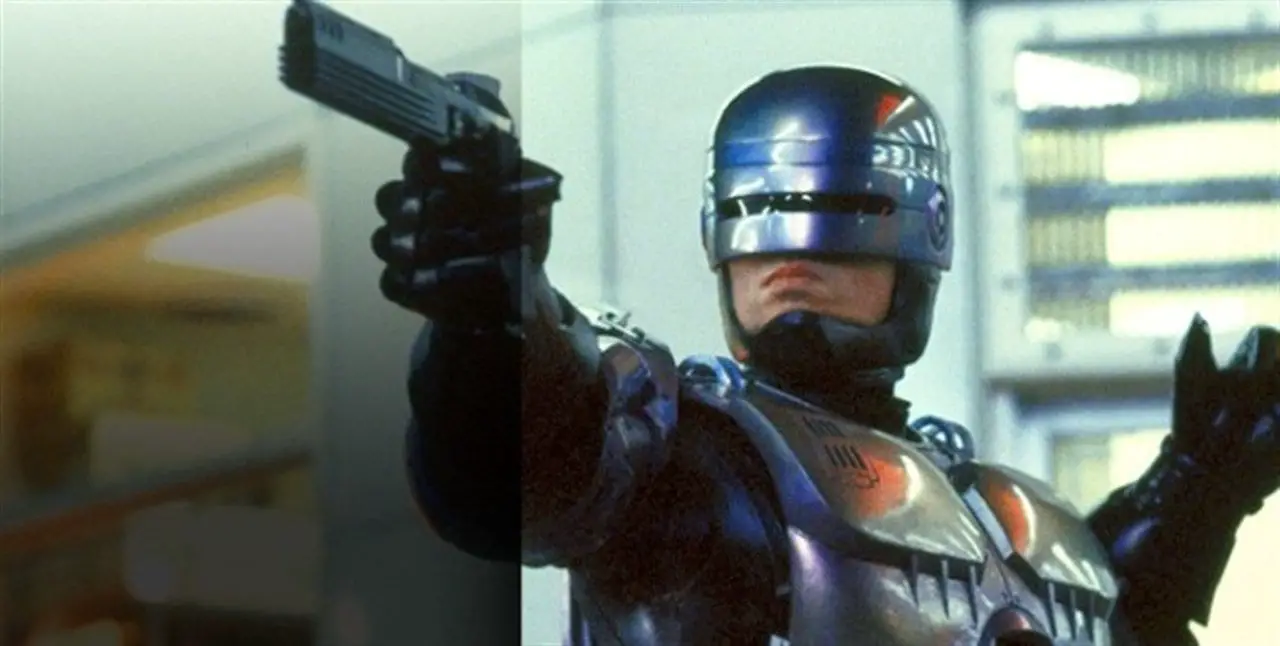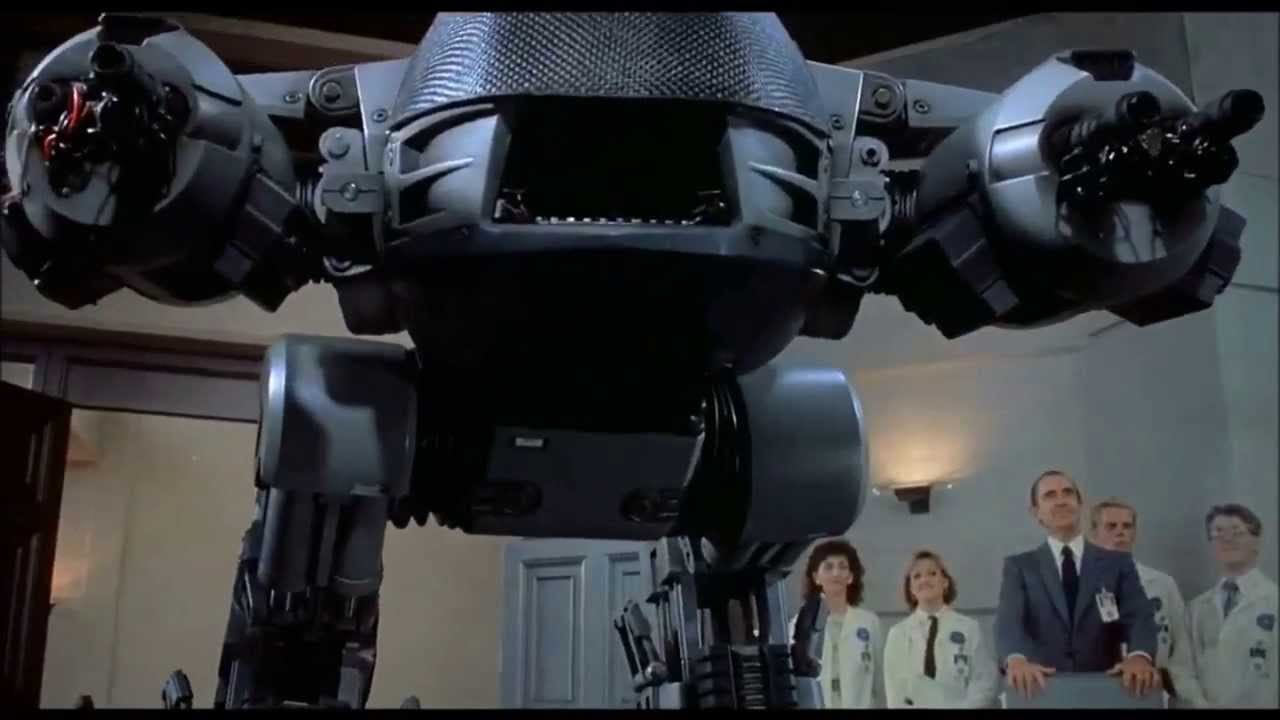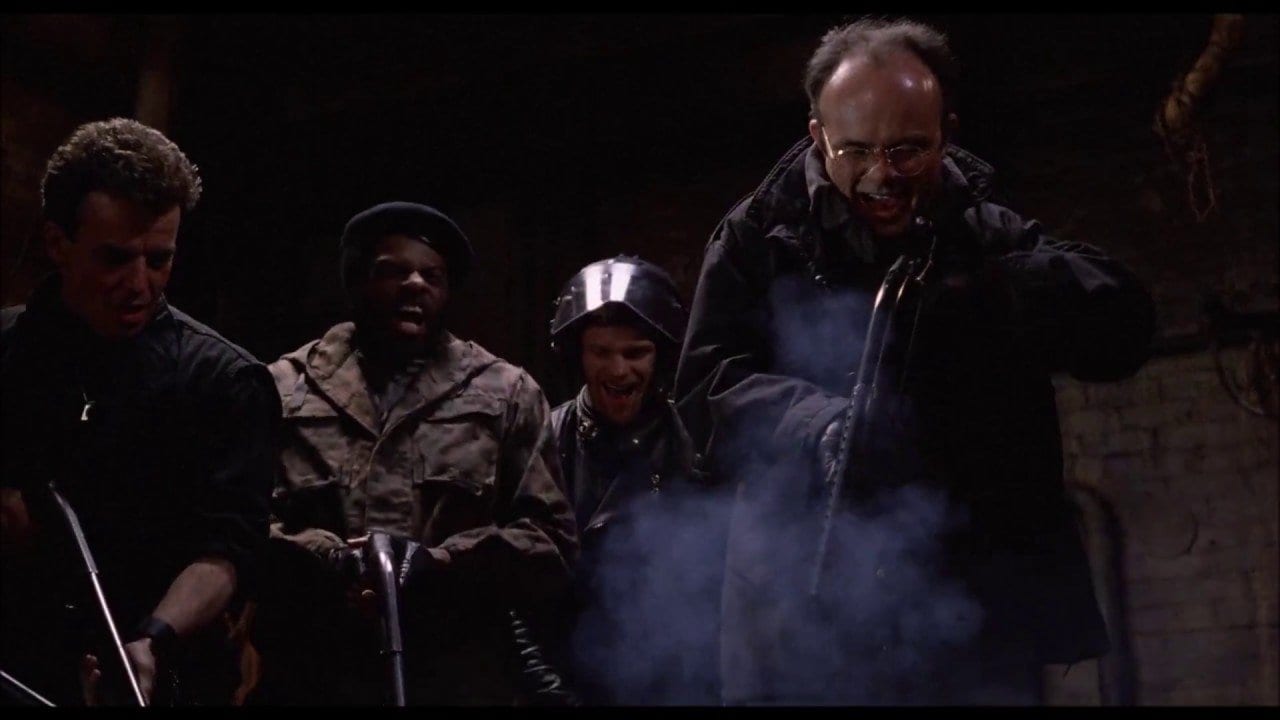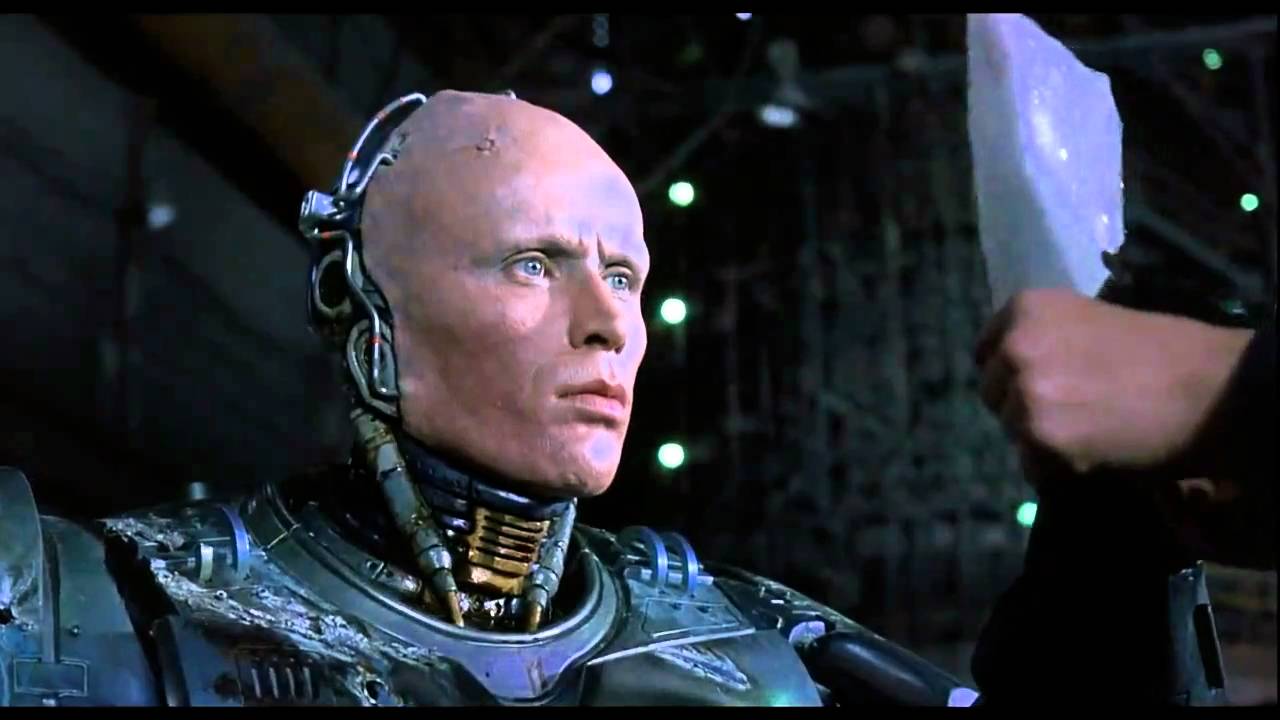Paul Verhoeven (Total Recall, Basic Instinct) has always been known for making sensational choices. Whether it was Sharon Stone’s infamous leg-crossing scene in Basic Instinct (1992) or the entirety of his trashterpiece Showgirls (1995), Verhoeven believed in putting a certain level of excess in his films that immediately made them endearing to a legion of fans while at the same time never quite being taken seriously by others. His films fall strangely somewhere between camp and satire, and at times it’s easy to wonder if even he knows the difference. Robocop (1987) is no exception. The film is at once equal parts social satire centering on the technological-addled corporate takeover of government run amok, and also a hard-R action masterpiece that borderlines on being tailor-made for the grind-house.
Set in a crime-ridden distant future dystopian Detroit, Robocop is a world that is ever reliant on A.I. technology at home, in the office, and (especially for our purposes), in law enforcement. Much like Verhoeven’s campy take on Robert Heinlein’s science fiction masterpiece Starship Troopers (1997), Robocop gives the audience world building information through darkly comic news broadcasts. None of these would feel out of place today but really give a sense that the audience is stepping into an entire world in a really cheap effective manner.

Through these news reports and the opening scenes establishing what is known as ‘Old Detroit’, Robocop is a movie wherein the government is not only corrupt, but entirely inept. People are starving by the thousands in the streets in direct contrast to the Gordon Gecko look-a-likes working in the shiny office district for OCP (Omni Consumer Products.)
The OCP is where all the fun A.I. work is done in Robocop‘s Detroit. The corporation is essentially a mega conglomeration that runs every aspect of the government in Detroit, even funding the police force. OCP’s main agenda, however, is the creation of a super-soldier like cop machine to police the streets. The human element of policing would be entirely taken away, which is exactly what the big wigs want. Controlling the starving population while taking out the rampant gang violence is easier with machines that do not have to be paid.

ED-209 is OCP’s big answer to the rampant crime that their own policies have helped create. OCP is just like any corporation in the real world: they are only interested in their bottom line. They see the people that they are supposed to be serving as a nuisance to be eradicated, as subhuman. Think back to our own history with private contract groups shadow running the Iraq War and you’re pretty close. OCP operates with complete impunity and answers not only without oversight but have no problem killing anyone within or without the company that attempts to hinder their “progress” in any way.
When ED-209, the advanced A.I. attack droid masquerading as a new kind of cop, goes haywire in its initial presentation at an OCP board meeting and viciously murders a senior executive, the company’s president (Halloween III‘s Dan O’Herlihy) is forced to consider other options. And fast. Sensing his chance to move up the corporate ladder, cutthroat VP Bob Morton (Twin Peaks‘s Miguel Ferrer) seizes the moment and turns another man’s failure into his gain by suggesting in place of the ED-209 that he be given permission to go ahead with his “Robocop” protocol.
The “old man” agrees, and Robocop is off to the races as a film and as a product. The problem with the project was something that OCP could easily work around with their lack of moral compass. The idea was exactly what it sounded like. A volunteer cop would be infused with A.I. to be made an enhanced super cop: one that always knows who is guilty, one that never misses, and one that comes without a human element. Of course, Bob could never find a cop foolish enough to volunteer for the “Robocop” program to get it off the ground, but now time was of the essence.
Further proving that OCP can do whatever the hell it wants to whoever the hell it wants in the Detroit of Verhoeven’s Robocop, Bob and his team of scientists just figure why wait for a volunteer when they can just wait for one of the many gang victims to come wheeling into the station and just use whatever “life” is left to build this A.I. around. That’s when Sgt. James “Alex” Murphy (Peter Weller) enters the picture. After a run-in with the most dangerous gang operating in Detroit, Murphy is viciously shot to pieces by gang leader Red (That 70’s Show‘s Kurtwood Smith). That’s maybe how his story should have ended.

Instead, Murphy was pretty much abducted by Bob’s scientists and infused with the A.I. technology to make him Robocop. He’s stronger, faster, and Weller plays the character as if The Terminator had somehow been programmed by a group of hall monitors. The film wants the audience to empathize with Murphy/Robocop, but it’s hard as an adult to not think of the bigger picture.
This world may have seemed radical in 1987 but the Reagan and “me” generation satire that Verhoeven was going for with Robocop isn’t that far off from 2019 America. We are a society that is almost entirely propelled by A.I. We have computers in our pockets tracking our every movement and everything we have ever done or said is just a mouse click away.

Media is increasingly divisive as people only watch outlets that sensationalize stories for ratings and inspire mob-like mentalities from the population. It may sound like a tin foil hat just landed on top of this article, and that would be beautiful if that were actually the case. It’s alarming to the extent to which Robocop got things like our own relationship with A.I. right to the point where one wonders if the ideas or the films came first.

The human element wins out in Robocop as it usually does in these type of films. No matter what Bob and his scientists do, they cannot drive the human element out of Murphy. Memories of his wife and kid build and boil over until he finds himself seemingly malfunctioning, but in reality, he is a human that is having a breakthrough. No cop would ever sign up for such a ridiculous endeavor willingly, even in a Paul Verhoeven movie, because they would be more machine than man, entirely run by A.I. The end of Robocop plays out in true comic book fashion, with the villains all meeting their end at the hands of the A.I. they made with the help of the people they were oppressing and exploiting.
Too bad the real world can’t tie up as nicely as Robocop. The world doesn’t seem to be slowing down any time soon concerning our relationship with A.I. The world we live in now has far surpassed the “future” presented in Paul Verhoeven’s sci-fi classic. Hell, Detroit has arguably fared worse than the dystopia of Robocop. There’s a reality star president in the White House, and people flock to their television screens to watch mind-crushing crap that makes “I’d Buy That For A Dollar” seem like The Sopranos. The world never needed anything like a Robocop, but the world could learn a thing or two about itself from watching Robocop.


